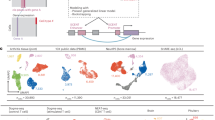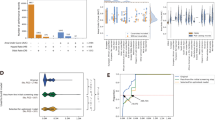Abstract
Hereditary colon cancer is caused by mutations in several different loci. The APC gene on chromosome 5 causing adenomatous polyposis coli represents a minority of the inherited colon cancer cases, while hereditary–non polyposis colon cancer (HNPCC) may cause five percent of all human colon cancer. One gene causing HNPCC was recently mapped to chromosome 2 but the same study also showed that at least one additional locus may cause HNPCC. We now present tight linkage between a polymorphic marker on the short arm of chromosome 3 and the disease locus, and find that these families also manifest signs of a general DNA replication disorder.
This is a preview of subscription content, access via your institution
Access options
Subscribe to this journal
Receive 12 print issues and online access
$209.00 per year
only $17.42 per issue
Buy this article
- Purchase on Springer Link
- Instant access to full article PDF
Prices may be subject to local taxes which are calculated during checkout
Similar content being viewed by others
References
Warthin, A.S. Heredity with reference to carcinoma. Arch. Int. Med. 12, 546–549 (1913).
Mecklin, J.P., Järvinen, H. & Peltokallio, P. Cancer family syndrome, Genetic analysis of 22 Finnish kindreds. Gastroenterology 100, 328–333 (1986).
Lynch, H.T., Rozen, P. & Schuelke, G.S. Hereditary colon cancer: polyposis and nonpolyposis variants. CA. Cancer J. Clin. 35, 95–114 (1985).
Lynch, H.T. et al. Hereditary non polyposis colorectal cancer (Lynch syndromes I and II). Cancer 15, 934–938 (1985).
Herrera, L., Kakati, S., Gibas, L., Pietrzak, E., Sandberg, A. Brief clinical report: Gardner syndrome in a man with an intersitial deletion of 5q. Am. J. med. Genet. 25, 473–476 (1986).
Bodmer, W.F. et al. Localization of the gene for familial adenomatous polyposis on chromosome 5. Nature 328, 614–616 (1987).
Leppert, M. et al. The gene for familial polyposis coli maps to the long arm of chromosome 5. Science 238, 1411–1413 (1987).
Kinzler, K.W. et al. Identification of FAP locus genes from chromosome 5q21. Science 253, 661–665 (1991).
Groden, J. et al. Identification and characterization of the familial adenomatous polyposis coli gene. Cell 66, 589–600 (1991).
Pältomäki, P. et al. Genetic mapping of a locus predisposing to human colorectal cancer. Science 260, 810–812 (1993).
Aaltonen, L.A. et al. Clues to the pathogenesis of familial colorectal cancer. Science 260, 812–816 (1993).
Thibodeau, S.N., Bren, G. & Schaid, D. Microsatellite instability in cancer of the proximal colon. Science 260, 816–819 (1993).
Ionov, Y., Peinado, M.A., Malkhosyan, S., Shibata, D. & Perucho, M. Ubiquitous somatic mutations in simple repeated sequences reveal a new mechanism for colonic carcinogenesis. Nature 363, 558–561 (1993).
Spirio, L. et al. A CA-repeat polymorphism close to the adenomatous polyposis coli (APC) gene offers improved diagnostic testing for familial APC. Am. J. hum. Genet. 52, 286–296 (1993).
Fearon, E.R. et al. Identification of a chromosome 18q gene that is altered in colorectal cancers. Science 247, 49–56 (1990).
Erlandsson, R. et al. A gene near the D3F15S2 site on 3p is expressed in normal human kidney but not or only at a severely reduced level in 11 of 15 primary renal cell carcinomas (RCC). Oncogene 5, 1207–1211 (1990).
Jones, M.H., Yamakawa, K. & Nakamura, Y. Isolation and characterization of 19 dinucleotide repeat polymorphisms on chromosome 3p. Hum. molec. Genet. 1, 131–133 (1992).
Ott, J. A computer program for linkage analysis of general human pedigrees: letter. Am. J. hum. Genet. 28, 528–529 (1976).
NIH/CEPH Collaborative Mapping Group. A comprehensive genetic linkage map of the human genome. Science 258, 67–86 (1992).
Vasen, H.F.A. et a. Screening of families predisposed to cancer development in the Netherlands. Anticancer Res. 10, 555–563 (1990).
Vogelstein, B. et al. Genetic alterations during colorectal-tumor development. New Engl. J. Med. 319, 525–532 (1988).
Williamson, R. et al. Report of the DNA committee and catalogues of cloned and mapped genes, markers formatted for PCR and DNA polymorphisms. Cytogenet. cell Genet. 58, 1190–1662 (1991).
Author information
Authors and Affiliations
Rights and permissions
About this article
Cite this article
Lindblom, A., Tannergård, P., Werelius, B. et al. Genetic mapping of a second locus predisposing to hereditary non–polyposis colon cancer. Nat Genet 5, 279–282 (1993). https://doi.org/10.1038/ng1193-279
Received:
Accepted:
Issue Date:
DOI: https://doi.org/10.1038/ng1193-279
This article is cited by
-
Serendipity Strikes: How Pursuing Novel Hypotheses Shifted the Paradigm Regarding the Genetic Basis of Colorectal Cancer and Changed Cancer Therapy
Digestive Diseases and Sciences (2023)
-
Linkage analysis revealed risk loci on 6p21 and 18p11.2-q11.2 in familial colon and rectal cancer, respectively
European Journal of Human Genetics (2019)
-
Lack of association between screening interval and cancer stage in Lynch syndrome may be accounted for by over-diagnosis; a prospective Lynch syndrome database report
Hereditary Cancer in Clinical Practice (2019)
-
Phenotypic and genotypic heterogeneity of Lynch syndrome: a complex diagnostic challenge
Familial Cancer (2018)
-
Mutations in context: implications of BRCA testing in diverse populations
Familial Cancer (2018)



